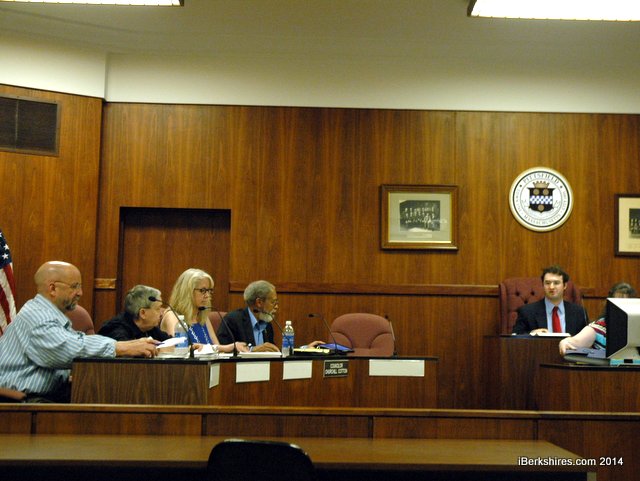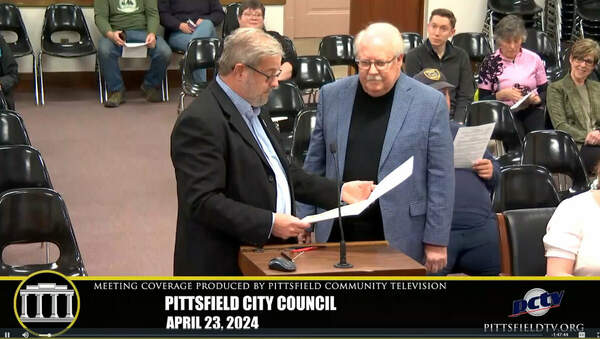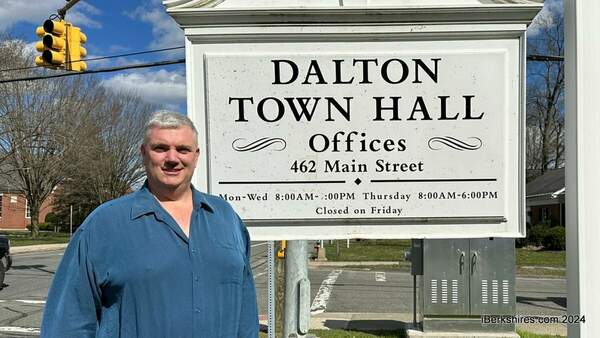State Orders Pittsfield To Release Contested Documents
 The Human Rights Commission earlier this year. The secretary of the commonwealth ordered the release of documents — mostly emails, letters and meeting minutes — related to a discrimination case brought against Mayor Daniel Bianchi. The Human Rights Commission earlier this year. The secretary of the commonwealth ordered the release of documents — mostly emails, letters and meeting minutes — related to a discrimination case brought against Mayor Daniel Bianchi. |
PITTSFIELD, Mass. — Following a several month process of appeals and review, the Public Records Division of the secretary of the commonwealth has ordered the release of requested documents pertaining to the city's Human Rights Commission's investigation of a complaint against Mayor Daniel Bianchi.
"The City and the HRC are hereby ordered to provide the responsive records to Mr. Durwin in a manner consistent with this order, the Public Records Law and its Access Regulations," stated Supervisor of Records Shawn Williams in a formal letter, citing insufficient legal support for the denial of these records by City Solicitor Kathleen Degnan.
This order follows a multistep process in the wake of a public records request filed on July 2, 2014, requesting all documents provided to the Human Rights Commission related to its investigation of a formal complaint against Bianchi filed by Medford resident Doreen Wade.
On July 8, City Clerk Linda Tyer responded to indicate that this request had been denied, following an advisement by Degnan that these records were exempt Massachusetts General Laws Chapter 4, Section 7, Clause 26, Paragraph (c), that "personnel and medical files or information; also any other materials or data relating to a specifically named individual, the disclosure of which may constitute an unwarranted invasion of personal privacy."
"If someone makes a public records request, during the middle of an investigation, my answer would be no," Degnan explained to the commission at its July 22 meeting. "Who would want to file a complaint to this body knowing that everything they say and everything they mention would be scrutinized by the public?"
According to the state records authorities, however, the rationale provided in the solicitor's denial failed to meet the requirements of the law cited. Following an appeal by this correspondent, the supervisor of records on Aug. 22 issued a decision overturning the record denial, indicating that this law clearly states "the burden shall be upon the custodian to prove with specificity the exemption which applies."
"It is my finding that the City has failed to satisfy its burden in responding to this records request," Williams wrote. "The City has provided no specificity with respect to the applicability of the exemption claimed and is not permitted to issue a blanket denial without providing any further information with respect to the requested records."
At this time, the state ordered that the requested records be turned over, or that an appeal be filed providing more specific information for the denial. Opting for the latter option, on Sept. 3, Degnan issued a response, expanding on the relevance of the previously cited exemption, and citing an additional exemption to MGL c.4, sec.7cl(26)(f), for "investigatory materials compiled out of the public view by law enforcement or other investigatory officials."
"The Human Rights Commission has the power to create a subcommittee; one of them being tasked to investigate the claims of a Complainant," wrote Degnan in the Sep. 3 appeal. "Said subcommittee is exempt from Open Meeting law as they do not deliberate upon any matter, they simply ask questions."
At the time, no subcommittees of the Human Rights Commission existed. A subcommittee to investigate Wade's complaint was first formed at its Nov. 13 meeting.
Additionally, concern about the possibility of a lawsuit was cited as a reason for the denial in the appeal.
"The City submits that, if the notes, memoranda and documents that were received and/or created during the course of this investigation were disclosed, that both the Human Rights Commission, as well as the City of Pittsfield, risk the initiation of litigation by the Complainant on the grounds that her personal privacy was violated," wrote Degnan.
In response, on Oct. 6, an attorney for the Supervisor of Records' office notified this correspondent that it had requested the City to submit to an "in camera" (i.e., private) review of the records in question in order to help make a determination on the validity of the exemption.
Following this review, the Supervisor of Records issued a determination on Dec. 11 that the exemptions cited were insufficient to warrant continued withholding of the records
"In a letter that accompanied the in camera materials you identified records that the HRC believes are not exempt from disclosure," wrote Williams.
Furthermore, the continued inactivity of any investigation since the abrupt adjournment of the HRC's July meeting prompted the commonwealth to find that statements in the city's appeal indicating release of the records would adversely affect "the HRC's ability to conduct a fair and thorough investigation" were no longer valid.
"It appears that many months have passed since this complaint was filed," Williams stated, "and no information was provided to this office by you, the City or the HRC to indicate that any investigation is active at this time."
Accordingly, the commonwealth ordered on Dec. 11 that the city release all requested documents. On Dec. 29, Degnan issued a notification of its intent to disclose 200 pages of records pertaining to the complaint against Bianchi by Wade.
Here is Part One and Part Two of a story on what was in the documents.
Notice of Decision- Pittsfield HRC Records
Tags: human rights, municipal complaint, public records, secretary of state,















